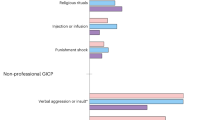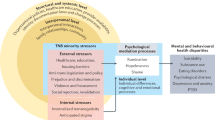Abstract
Research into access to and experiences with healthcare services of gender-diverse and trans individuals remains scarce. In this paper, self-reported experiences with general and trans-specific healthcare services were analyzed for differences between gender-diverse people, trans men, and trans women, using data from a five-country survey. More than half of all respondents indicated they had delayed general healthcare services at least once because of their gender identity, mostly out of fear of being treated badly. Almost one in four participants felt personally discriminated against in general healthcare services within the previous year. Gender-diverse people had significantly less experiences with seeking trans-specific healthcare. Additional effects were found for different socio-demographic variables (age; sex assigned at birth; educational level; socioeconomic status; and belonging to an ethnic, sexual, and/or disability minority). Gender-diverse people gave significantly worse evaluations of trans-specific healthcare services (in general as well as for specific types of trans-specific healthcare). The findings highlight the need for healthcare providers in creating inclusive healthcare settings, with attention for gender-diverse clients and those belonging to precarious minority groups due to their level of education or sexual, disability, and/or ethnic background.
This is a preview of subscription content, access via your institution
Access options
Subscribe to this journal
Receive 8 print issues and online access
$259.00 per year
only $32.38 per issue
Buy this article
- Purchase on Springer Link
- Instant access to full article PDF
Prices may be subject to local taxes which are calculated during checkout
Similar content being viewed by others
Data availability
Restrictions apply to the availability of the data. Data were obtained from Transgender Europe and are available from the authors with the permission of Transgender Europe.
References
Richards C, Bouman WP, Seal L, Barker MJ, Nieder TO, T’Sjoen G. Non-binary or genderqueer genders. Int Rev Psychiatry. 2016;28:95–102.
Harrison J, Grant J, Herman JL. A gender not listed here: Genderqueers, gender rebels, and otherwise in the National Transgender Discrimination Survey. LGBTQ Public Policy J Harv Kennedy Sch. 2012;2:13–24.
Warren JC, Smalley KB, Barefoot KN. Psychological well-being among transgender and genderqueer individuals. Int J Transgenderism. 2016;17:114–23.
McNeil J, Bailey L, Ellis S, Morton J, Regan M. Trans Mental Health Survey. Edinburgh: Scottish Transgender Alliance; 2012.
Burgwal A, Gvianishvili N, Hard V, Kata J, Nieto IG, Orre C, et al. Health disparities between binary and non binary trans people: a community-driven survey. Int J Transgenderism. 2019;20:218–29.
Smiley A, Burgwal A, Orre C, Summanen E, García Nieto I, Vidic J, et al. Overdiagnosed but underserved. Trans Healthcare in Georgia, Poland, Serbia, Spain, and Sweden: Trans Health Survey. Transgender Europe website; 2017.
IBM Corp. IBM SPSS Statistics for Windows, version 26.0. Armonk, NY: IBM Corp; 2018.
Cohen J. Statistical power analysis for the behavioral sciences. United States of America: Lawrence Erlbaum Associates; 1988.
Hsieh FY, Bloch DA, Larsen MD. A simple method of sample size calculation for linear and logistic regression. Stat Med. 1998;17:1623–34.
Frost J. What are the effects of multicollinearity and when can i ignore them? The Minitab Blog. Pennsylvania: State College; 2013.
Grant JM, Mottet LA, Tanis J, Herman JL, Harrison J, Keisling M. National Transgender Discrimination Survey Report on Health and Health Care. National Gay and Lesbian Task Force website; 2010.
Fundamental Rights Agency. Being Trans in the European Union. Comparative analysis of EU LGBT survey data. Fundamental Rights Agency website: European Union Agency for Fundamental Rights; 2014.
European Union Agency for Fundamental Rights. A long way to go for LGBTI equality. Luxembourgh: Publications Office of the European Union; 2020.
European Union Agency for Fundamental Rights. Being trans in the European Union. Comparative analysis of EU LGBT survey data. Luxembourgh: Publications Office of the European Union; 2014.
Goldberg AE, Kuvalanka KA, Budge SL, Benz MB, Smith JZ. Health Care Experiences of Transgender Binary and Nonbinary University Students. Couns Psychol. 2019;47:59–97.
Grant JM, Mottet LA, Tanis J, Harrison J, Herman JL, Keisling M. Injustice at every turn: a report of the national transgender discrimination survey. National Gay and Lesbian Task Force website; 2011.
Meyer IH. Minority Stress and Mental Health in Gay Men. J Health Soc Behav. 1995;36:38.
Meyer IH. Prejudice, social stress, and mental health in lesbian, gay, and bisexual populations: Conceptual issues and research evidence. Psychol Bull. 2003;129:674–97.
Missiaen J, Seynaeve H. Onderzoek naar het psychisch welzijn van Vlaamse holebi’s en/of transgender personen: risico- en beschermende factoren in kaart gebracht voor lifetimeprevalentie van suïcidepogingen. Ghent: Ghent University; 2016.
Acknowledgements
The questionnaire development and data collection were coordinated by Transgender Europe (TGEU) using the framework of their project “Trans Health Study”, in close collaboration with its partner organizations “Women’s Initiative Supportive Group” (WISG) (Georgia), “Trans-Fuzja” (Poland), “Daniela Fundación” (Spain), “Geten” (Serbia), and the “Riksförbundet för homosexuellas, bisexuellas, transpersoners, queeras och intersexpersoners rättigheter” (RFSL) (Sweden). The authors acknowledge the work done by these organizations.
Funding
The study was funded by Transgender Europe.
Author information
Authors and Affiliations
Corresponding author
Ethics declarations
Conflict of interest
The authors declare no competing interests.
Institutional review board statement
The study was conducted according to the guidelines of the Declaration of Helsinki. No specific ethical approval was applied for since general ethical research principles in data gathering and data storage were followed, according to the Belgian law regarding experiments on humans (Wet inzake experimenten op de menselijke persoon). Potential participants were informed about the topics of the survey, the aim of the survey and the parties involved in the data gathering and analytical process, and had to give their explicit consent before they were able to proceed with the online survey.
Additional information
Publisher’s note Springer Nature remains neutral with regard to jurisdictional claims in published maps and institutional affiliations.
Rights and permissions
About this article
Cite this article
Burgwal, A., Motmans, J. Trans and gender diverse people’s experiences and evaluations with general and trans-specific healthcare services: a cross-sectional survey. Int J Impot Res 33, 679–686 (2021). https://doi.org/10.1038/s41443-021-00432-9
Received:
Revised:
Accepted:
Published:
Issue Date:
DOI: https://doi.org/10.1038/s41443-021-00432-9
This article is cited by
-
Why do transgender individuals experience discrimination in healthcare and thereby limited access to healthcare? An interview study exploring the perspective of German transgender individuals
International Journal for Equity in Health (2023)
-
Exploring Work Absences and Return to Work During Social Transition and Following Gender-Affirming Care, a Mixed-Methods Approach: ‘Bridging Support Actors Through Literacy’
Journal of Occupational Rehabilitation (2023)



